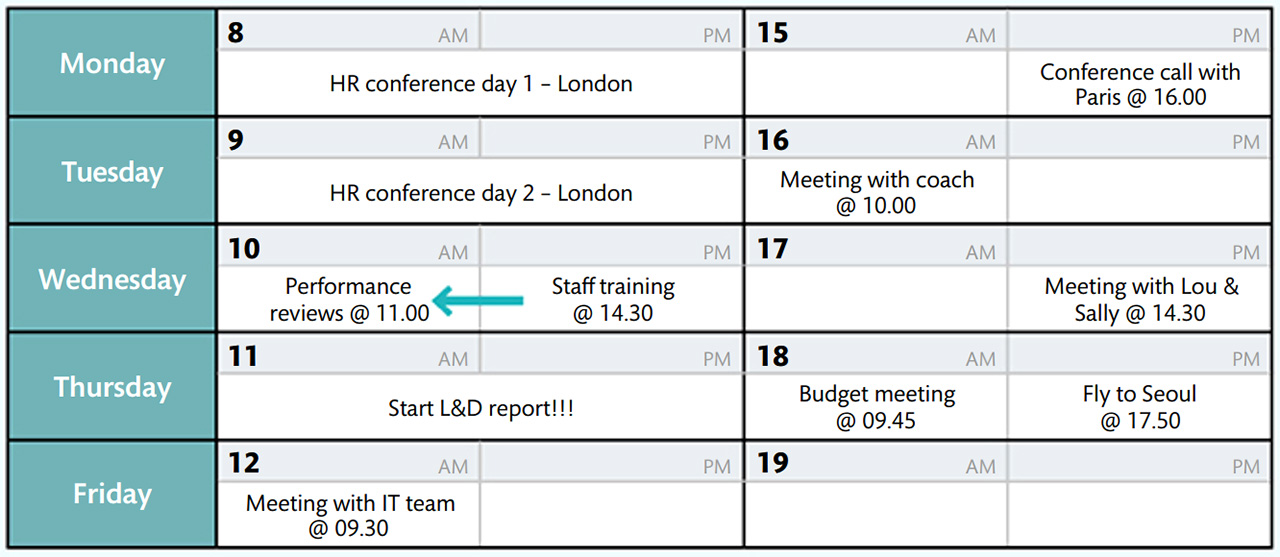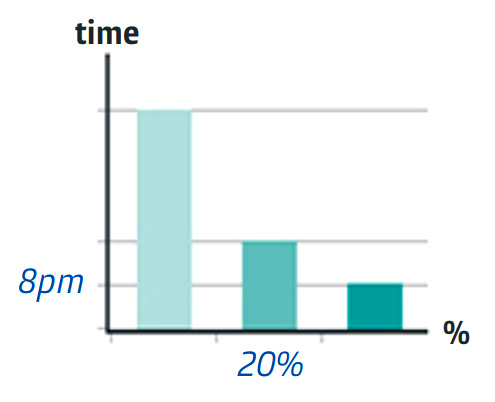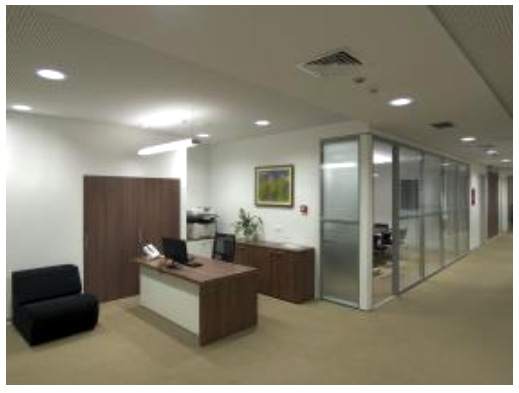Exercise 1
A. Listen to three people talking about their work patterns. Make notes about their jobs and working hours.
Speaker 1 ……………………………………
Speaker 2 ……………………………………
Speaker 3 ……………………………………
Answer & Audioscript
Speaker 1 is a nurse, she works part-time three days a week, her 9-hour shifts are often 11 or 12 hours, she often can’t take her breaks.
Speaker 2 is a university student. She does temporary jobs for an agency in hotels, conferences and events. She starts work next week as an intern in a hotel and wants to get a permanent job there.
Speaker 3 retired last year. He now works as a taxi driver through an app. He has a flexible schedule, decides his own working hours and likes to work five or six hours a day.
Audioscript
1
I thought it was a good idea to go part-time at the hospital when my daughter was born, but it’s hard work. It sounds nice to say I only work three days a week, but nurses work long hours and a nine-hour shift usually turns into 11 or 12 hours. That’s more than most people who work in full-time jobs. And it isn’t always possible to take my breaks if there is a lot of work to do.
2
I’m studying for my degree in tourism management and I work for an agency in my free time. Doing temporary jobs is a good way to earn money at weekends and in the holidays. It’s the time when hotels need extra staff. If there’s a big event or conference on in the city, I miss classes for a few days. But next week I’m starting as an intern with a big hotel chain so I’m leaving the agency work. I know the hotel is a good employer and I hope they’ll offer me a permanent contract after my internship.
3
I’m a self-employed driver and I get my work from a taxi service app on my phone. I don’t have a fixed schedule and I decide my own working hours. I can work as much or as little as I want and I’m paid for each job I do. But after a ten-hour shift, drivers have to take a six-hour break, by law. But my working day is typically five or six hours. I don’t want to work more than that, you see, I retired last year, and this is just some extra money on top of my pension.
Exercise 2
A. Listen to Lou calling her colleague, Ian, about an appointment she made with him last week.
1 What date did Lou and Ian have an arrangement to meet?
2 Why is that date now not possible?
3 Does Lou want to make the appointment sooner or later? Why?
4 Who’s available on the following dates?
a Wed 10, morning: Lou / Ian
b Wed 10, afternoon: Lou / Ian
c Thu 11, afternoon: Lou / Ian
d Fri 12, afternoon: Lou / Ian
5 What does Ian offer to do to help?
B. In their conversation, Lou apologises for changing the meeting time, while Ian tries to be helpful. Listen again and note down examples of what they say.
Answer & Audioscript
A
1 On Wednesday the 17th.
2 Sally can’t make it. She’s in Vienna all that week.
3 Sooner. She’s going to the Berlin Expo the week after their original appointment.
4 a Ian b Lou c Lou d Ian
5 Ian offers to find out if he can move his training session on Wednesday afternoon.
B
Lou: Sorry to bother you; I’m afraid; it’s all my fault, I appreciate it, I know it’s a bit short notice; oh dear; I’m really sorry about this
Ian: Sure; no problem; let me see if I can move the training session
Audioscript
L = Lou I = Ian
L: Hello, Ian?
I: Speaking
L: Hi, Ian, it’s Lou.
I: Hi, Lou. What’s up?
L: Listen, sorry to bother you. I’m calling about our meeting on Wednesday the 17th.
I: Uh-huh.
L: I’m afraid Sally can’t make it.
I: Ah.
L: Yes, it’s my fault. I forgot she’s in Vienna all week. Do you mind if we x another time to meet?
I: Sure. Let me just check my schedule.
L: Thanks. I appreciate it.
I: Do you want to postpone the meeting till the following week?
L: Actually, no. That’s Berlin Expo week.
I: Oh, right, of course.
L: So, I was wondering if we could bring it forward. How about the week beginning the 8th?
I: Wait a minute, that’s next week, isn’t it?
L: Yeah, sorry. I know it’s a bit short notice. That’s why I’m calling.
I: Well, er, let’s see. I’m free on Wednesday morning. That’s the 10th. Any good?
L: Erm, could we make it the afternoon?
I: Mm, no good, I’m afraid. I’ve got a staff training session.
L: Well, … How about Thursday the 11th? After lunch?
I: I’m busy all day Thursday. Friday might be OK … How does the afternoon suit you?
L: Friday the 12th? No, Friday’s out for me, I’m afraid. Oh, dear, I’m really sorry about this.
I: No problem. Look, let me see if I can move the training session and call you back.
L: Good idea.
I: OK, leave it with me. Talk to you later.
L: Thanks, Ian, bye.
I: Bye, now.
Exercise 3
A. Ian immediately calls his assistant, James. Listen and note down the changes they make to Ian’s schedule.

B. Ian is more direct with James than Lou. Why do you think that is?
Answer & Audioscript
A
staff appraisals move from Wednesday morning to Friday morning; postpone IT meeting to Friday afternoon; staff training moves to Wednesday morning; meeting with people from head office (Lou and Sally) Wednesday afternoon
B
James is Ian’s assistant. Lou is from head office. You can be a little more direct with people you know well and who work for you, as long as you’re still polite! Ian makes sure to thank James at the end of their conversation.
Audioscript
I = Ian J = James
I: Hello, James. It’s Ian.
J: Oh, hi, Ian. What can I do for you?
I: It’s about our training session next Wednesday.
J: Ah, yes, …
I: Change of plan. We need to change the training to another day, I’m afraid. I’ve got an important meeting with Lou and Sally from head office and it’s the only time we’re all free.
J: Oh. Well, it’s a bit last minute, but, OK, what day were you thinking?
I: Well, why don’t we just move the training to the morning? I think that’s the easiest.
J: Wednesday morning? Ah, I think I’ve scheduled the staff performance reviews for then … Sorry, I forgot to tell you … yeah. Performance reviews: Wednesday morning.
I: Well, move those to Friday!
J: Friday. All right. Which is better for you: morning or afternoon?
I: Erm, morning’s better. Oh, wait a minute. I’ve got a meeting with the IT team on Friday morning. OK, that can wait. Let’s postpone it till the afternoon!
J: Postpone … IT meeting … OK, so that’s training on Wednesday the 10th in the morning.
I: Uh-huh.
J: Performance reviews on the Friday morning, the 12th.
I: Fine.
J: IT meeting in the afternoon. And that leaves you free on Wednesday afternoon for your meeting with the people from head office.
I: Brilliant! I knew there was a reason I made you my assistant. Thanks a lot, James.
C. Listen to Ian calling Lou back to confirm the details. Make brief notes.
MEETING PLANNER | Ian Henderson
Date: …………………
Time: …………………
Location: …………………
Attending: …………………
Arrangements: ………………………………………
Answer & Audioscript
Model answer
Date: Wed 10th
Time: 15:00
Location: My office
Attending: Lou, Sally, Tom
Arrangements: Set up presentation, book meeting room, reserve restaurant table for 4
Audioscript
L = Lou I = Ian
L: Good afternoon, Lou Klein speaking.
I: Hi, Lou. It’s Ian again.
L: Hi, there. Any luck changing your schedule?
I: Yes. We’re all set for the 10th.
L: Fantastic. So, just to con rm – we’re meeting in your office on Wednesday the 10th at, erm, how about 3 p.m.?
I: Sounds good.
L: That gives you time to set up for the presentation before we arrive. Oh, and I invited Tom Banks to join us. He works for Sally in research. So, there’ll be four of us in all.
I: Fine. Hm, with four of us I’d better ask James to book a meeting room. And how about something to eat afterwards? There’s a nice restaurant just near the office. I could book us a table if you like.
L: Perfect. Thanks a lot for being so flexible, Ian.
I: No problem. See you on Wednesday.
Exercise 4
A. Listen to Clara Olsen giving a presentation to the senior managers in Madrid about the company culture at Holsted. Find one difference between each point below and the presentation.
The Holsted company culture
1 Employees work 40 37 hours a week from Monday to Friday.
2 They are often expected to work long hours.
3 The working hours are fixed for most employees.
4 The work culture is very strict but effective.
5 Managers are responsible for how employees organise their time and projects.
6 Senior staff in the company can tell us their ideas and opinions.
7 It’s important to arrive on time for work; it shows you are professional.
Answer & Audioscript
1 Employees work 40 37 hours a week from Monday to Friday.
2 They are often not expected to work long hours.
3 The working hours are fixed flexible for most employees.
4 The work culture is very strict relaxed but effective.
5 Managers are aren’t responsible for how employees organise their time and projects.
6 Senior All staff in the company can tell us their ideas and opinions.
7 It’s important to arrive on time for work meetings; it shows you are professional.
Audioscript
C = Clara Olsen A = Álvaro Martínez
C: So, at this point I’d like to talk about the work culture of Holsted Pharmaceuticals. There are four main areas I want to mention.
First of all, I want to talk about the working hours at Holsted. The usual working week is 37 hours from Monday to Friday. That’s typical of Denmark in general. You aren’t expected to work long hours. As for the working day, the timetable at Holsted is quite flexible for most employees. Stacan decide their start times, finish times and lunch breaks depending on their individual needs.
We understand when employees need to collect children from school or have to leave early for personal reasons, like a dentist’s appointment. It’s completely acceptable to do that. Whenever possible we give employees the opportunity to adapt their working hours to their family’s needs. Our company work culture is very relaxed but effective.
Secondly, I want to talk about how we organise work and the relationship between managers and staff. There is a tradition that employees have a lot of individual responsibility for how they organise their own time and work. It is not generally the manager who decides how employees do their work. It is very important that staff meet deadlines and do their job well, but exactly how employees organise their time or projects is their responsibility.
And a third important point to mention is that all employees in Holsted are encouraged to tell us their ideas and opinions. This is very important because a level of staff participation and openness helps us to make better decisions.
And finally, I should say a word about meetings. It’s very important at Holsted to arrive on time to meetings. It shows you are professional and organised.
A: Sorry, sorry I’m late. I’ve just come from another meeting. So, what have I missed?
Exercise 5
A. Listen to part of a meeting between Clara Olsen, Vice President; Marina Beltran, Human Resources Manager; and Álvaro Martínez, Finance Manager; in Madrid. Look at Clara’s list of questions. Which questions are they discussing?
MEETING ABOUT WORK PATTERNS
1 What types of contracts are there? (full-time, part-time?)
2 How much holiday do employees get?
3 What are the working hours – start time, finish time?
4 Does the company let employees work flexible hours?
5 How long is the lunch break?
6 Can employees work from home?
B. Listen again and complete this extract from the meeting (0:00–0:32). Then complete the bar chart with the correct percentages and times.

As you can see from this bar graph, the working day is very long here in the Madrid office. On an average day only (1)……………. of our employees leave work by (2)……………. o’clock. At (3)……………. o’clock, (4)……………. percent of the staff are still here in the office and (5)……………. percent are still at their desks at (6)……………. in the evening.
C. Work in pairs. What is a suitable title for the graph?
D. Listen to the rest of the meeting again (0:32–2:19) and answer the questions.
1 What does Álvaro say about the lunch break?
2 What do Marina and Álvaro disagree about?
3 What does Marina say about staff working long days?
4 What risks does she say are possible?
Answer & Audioscript
A
3 & 5
B
1 half / 50% / fifty percent 2 six/6 3 seven/7
4 20/twenty 5 10/ten 6 8/eight (o’clock)
First column = 50% (half the employees are working at 6 p.m.); second column = 20% (20% are working at 7 p.m.); third column = 10% (10% are working at 8 p.m.)
Second line = 7 p.m.; top line = 6 p.m.
C
Possible answer
percentage of staff at work in the evening
D
1 It’s usual to have a two-hour lunch break from 2–4 p.m.
2 If staff like the long lunch break or not. Álvaro believes they like to have a good meal and socialize with colleagues, but Marina thinks most staff would prefer a shorter lunch break and the chance to go home earlier.
3 She thinks they won’t get so much work done later in the day when they do a long working day, because they are tired.
4 She thinks there could be accidents at work and more sick leave because staff are tired (and probably stressed).
Audioscript
C = Clara Olsen M = Marina Beltrán A = Álvaro Martínez
C: So, Marina, can you tell us more about the research your department has done?
M: Yes, well, you can see from this bar graph: the working day is very long here in the Madrid office. On an average day only half of our employees leave work by six o’clock. At seven o’clock twenty percent of the staff are still here in the office and ten percent are still at their desks at eight in the evening.
C: That’s incredible! When do they spend time with their families? What time do they have dinner?
M: Yes, these working hours are obviously a disaster for family life.
A: Well, it is fairly normal to do this in Spanish companies. And people have dinner late. We have a ‘split’ working day where we start at 8.30 and go for lunch about two o’clock. We have two hours for lunch so you get back to work at four.
It’s a good time to be sociable with co-workers, or go home for lunch if you don’t have to travel far, or have business lunches. A long lunch break means finishing work late. It’s always been part of our work culture.
M: I agree with Álvaro. It is traditional but I think many employees would prefer a shorter lunch break and the opportunity to go home an hour earlier.
A: I don’t think so. It’s the way we do things. People like to have a good lunch, not have a sandwich at their desks like they do in other countries.
M: Perhaps, but a lot of our employees are probably tired because of the long working hours and they won’t get so much work done late in the day. Long hours can also be a cause of accidents at work and sick leave.
C: Has that been a problem here?
M: I don’t know about our company, but international studies show people do more work within shorter hours. I mean, just look at Germany.
C: Yes, that’s true. Who has ever done their best work when they’re very tired?
Exercise 6
A. Listen to an interview with a student and tick the jobs she does.
1 working as a chef
2 taking food orders
3 serving food in restaurants
4 pouring drinks at events
5 delivering fast food
6 delivering parcels
7 working as a hotel receptionist
8 working in a pharmacy
9 working as a domestic cleaner
10 promoting holiday events
B. Listen again and decide if the statements are true (T) or false (F).
1 Amy doesn’t have to pay rent.
2 The flexibility of the gig economy is good for Amy.
3 Amy doesn’t like working for the catering company.
4 The interviewer doesn’t think being a bike courier is safe.
5 Amy often delivers food to office staff.
6 After she finishes university, Amy wants a job that offers training and a pension.
C. Listen again and complete the sentences with one word.
1 Amy is studying ……………… at the moment.
2 She wants to work in the ……………… industry when she graduates from university.
3 She needs to earn money to pay ……………… and buy food and clothes.
4 When she has ………………, she works less or stops working for a while.
5 She says that some of her ……………… are also working in the catering and hospitality industry.
6 She has done a lot of cycling and has never had an ……………… .
7 As a courier, she often delivers parcels or ……………… .
8 She is happy to carry on working in the ……………… economy while she is a student.
D. Choose the sentence which best describes Amy.
a She’s hard-working and wants an interesting and secure job in the future.
b She’s relaxed about work and would like to continue working for different companies.
c She’s happy to work in a dangerous environment.
Answer & Audioscript
A
2, 3, 4, 6
B
1 F – (‘I have a lot of expenses – rent, food, clothes, books’)
2 T
3 F – (‘It’s good. … I’ve never had a problem, really. And I’ve enjoyed it.)
4 T
5 F – (‘I don’t deliver meals or pizza or anything like that.’)
6 T
C
1 physics 2 oil 3 rent 4 exams 5 friends
6 accident 7 documents 8 gig
D
a
Audioscript
I = Interviewer A = Amy
I: Welcome to World of Work. Today we’re going to talk about the pros and cons of the gig economy. First on is Amy. Hello, Amy.
A: Hi. Thank you for having me on the show.
I: You’re welcome, Amy. So, you’re a student, aren’t you?
A: Yes, I am. I’m at university. I’m studying physics and I want to work in the oil industry when I graduate.
I: Wow! That’s great. It’s good that you know what you want to do. So, Amy, are you also working while you’re studying?
A: Yes – I have to, really. I have a lot of expenses – rent, food, clothes, books – it all adds up. But this kind of work is great for me. I think the gig economy is perfect for students, in fact. You can do a few hours a week while you’re studying, stop when you have exams, then do lots more in the holidays. I work for quite a few different companies. One is in the catering and hospitality industry.
I: OK, so what does that mean, Amy?
A: Basically, it’s working as a waiter or in the kitchen of a restaurant or hotel. Not as a chef, of course, but more like washing-up and cleaning – that sort of thing. We also do events, serving food and drinks. It’s good. You can get tips and you only work when you want to. There’s always work when you need it. I’ve never had a problem, really. And I’ve enjoyed it. A lot of the other gig workers are students too, and some are friends, so we have fun, but it’s hard work too.
I: Sounds good. And what other jobs do you do?
A: Actually, I love cycling and I’ve got a great road bike, so I often work as a bike courier. You get paid for each delivery, so you can do just a few deliveries or lots of them, depending on how much time you’ve got.
I: That sounds dangerous!
A: No, honestly, it isn’t. I wear a helmet and I’m very careful. I’m also a very experienced cyclist. I’ve never had an accident. I usually take small parcels or documents from one office to another – like contracts, for example. I don’t deliver meals or pizza or anything like that.
I: So there aren’t really any disadvantages – any cons – to the gig economy for you?
A: Well, not at the moment, but I don’t want to do this sort of work when I leave university. I want a career, a full-time job with holiday pay, a pension and everything else that you get with a proper job – you know, training, promotions and so on. I don’t want to be cycling for a living when I’m thirty!
Exercise 7
A. Complete the dialogue between Pavel and Laila with the phrases in the box. Then listen and check.
|
check my schedule do you mind if I’m calling about it forward out for me short notice so flexible to confirm to postpone it which is better |
P: Pavel Orlov speaking.
L: Pavel, hi. It’s Laila.
P: Hi, Laila. What can I do for you?
L: Well, (1)………………… our meeting on Tuesday next week.
P: You mean, the 12th? Do you want (2)…………………?
L: No, no. It’s just that I’ve got a bit of a problem. You see, there’s a training session at our head office on Tuesday and I really have to be there.
P: That’s OK. Don’t worry.
L: I know it’s a bit (3)………………… .
P: No, that’s fine.
L: So (4)………………… we fix another time to meet?
P: Fine. Let me just (5)………………… … I’m free on Friday the 15th. How does the morning suit you?
L: Oh sorry, Pavel. I’m busy all day on Friday. How about Thursday?
P: No, sorry, Thursday’s (6)…………………, I’m afraid. All-day meeting …
L: OK … Um, can we bring (7)…………………, maybe? How about Monday the 11th?
P: Yeah, Monday’s good.
L: Great. (8)………………… for you: morning or afternoon?
P: Morning’s fine.
L: Right. So just (9)…………………: the meeting will be on Monday the 11th.
P: Yes, Monday morning. 9.30?
L: Perfect. Thanks for being (10)…………………, Pavel. I appreciate it.
P: No problem. See you then.
Answer & Audioscript
1 I’m calling about 2 to postpone it 3 short notice
4 do you mind if 5 check my schedule 6 out for me
7 it forward 8 Which is better 9 to confirm 10 so flexible
Audioscript
P = Pavel L = Laila
P: Pavel Orlov speaking.
L: Pavel, hi. It’s Laila.
P: Hi, Laila. What can I do for you?
L: Well, I’m calling about our meeting on Tuesday next week.
P: You mean, the 12th? Do you want to postpone it?
L: No, no. It’s just that I’ve got a bit of a problem. You see, there’s a training session at our head office on Tuesday and I really have to be there.
P: That’s OK. Don’t worry.
L: I know it’s a bit short notice.
P: No, that’s fine.
L: So do you mind if we fi x another time to meet?
P: Fine. Let me just check my schedule … I’m free on Friday the 15th. How does the morning suit you?
L: Oh sorry, Pavel. I’m busy all day on Friday. How about Thursday?
P: No, sorry, Thursday’s out for me, I’m afraid. All-day meeting …
L: OK … Um, can we bring it forward, maybe? How about Monday the 11th?
P: Yeah, Monday’s good.
L: Great. Which is better for you: morning or afternoon?
P: Morning’s fine.
L: Right. So just to confirm: the meeting will be on Monday the 11th.
P: Yes, Monday morning. 9.30?
L: Perfect. Thanks for being so flexible, Pavel. I appreciate it.
P: No problem. See you then.
Test
1. You will hear eight short recordings twice. For questions 1–8 choose the correct answer.
1 How many days a week does the man work?
a 3
b 5
c 7
2 What does the man do at lunchtime?
a

b

c

3 Who is going to finish preparing the presentation?
a Sandra
b Dmitri
c Rens
4 What kind of work is the company offering?
a permanent
b flexible hours
c full time
5 What do the man and woman decide to do about the staff party?
a delay it until summer
b book a restaurant now
c ask for different ideas
6 What is the new meeting date?
a Monday 6 June
b Wednesday 8 June
c Monday 13 June
7 What was the woman’s first job?
a a shop assistant
b delivering newspapers
c cleaner
8 Where are they going to meet?
a

b

c

Answer & Audioscript
1 a 2 b 3 c 4 b 5 c 6 c 7 a 8 b
Audioscript
1 How many days a week does the man work?
I like my job mainly because it’s part-time. I mean, I do a seven-hour day, but only on Mondays, Wednesdays and Thursdays. This means I have a lot of time to do other things and with five children there are always a lot of other things to do!
2 What does the man do at lunchtime?
A: Welcome to the team!
B: Thanks. What do people normally do for lunch here?
A: You have a lot of options. There are plenty of cafés and shops around this area you can buy food from, and lots of people go for lunch together. There’s a canteen on the top floor. I usually take my food there and spend time reading. It’s more relaxing after such a busy morning!
3 Who is going to finish preparing the presentation?
A: Hi Sandra, what did you think about the meeting with Rens?
S: Well, I know he wanted our input on the presentation but I didn’t have much to say.
A: Yes, I felt the same way.
S: Do you think we should think of more ideas and email him, Dmitri?
A: I don’t know. I think he’s decided to finish it himself now.
4 What kind of work is the company offering?
Thank you for applying for this position. Let me tell you a little more about the job before we start the interview. So, as you know, the role is for four months over Christmas and you’ll be working different shifts, so you will work some nights, but then have some afternoon or morning work on other days. The pay is seventeen dollars an hour.
5 What do the man and woman decide to do about the staff party?
A: We should book a restaurant for the staff party. It’s been on the agenda for months. Let’s make a decision now.
B: It’s not that easy. There are lots of things to think about.
A: What do you mean?
B: Well, people have different food requirements. Let’s think of other ideas. It might be nice to have an event where people can bring their families and maybe do something outside …
A: OK, well, let’s send an email and get everyone’s input.
6 What is the new meeting date?
R: Hello, Roy Hopkins. How can I help you?
A: Hi, it’s Angela from Noble Systems here. How are you?
R: Hi, Angela. I’m well, thanks, and you?
A: Good thanks. I’m just calling because I need to reschedule our meeting on Wednesday the eighth of June.
R: Sure. Let me look at my diary. I’m free on the Monday afternoon, that’s the thirteenth, does that suit you? If not, we could bring it forward to the Monday the sixth.
A: I think the later date would work best. Thanks so much.
7 What was the woman’s first job?
I’ve been in the fashion business for about twenty years now, but I haven’t always had a successful job like this. When I was younger, I used to clean around the house for extra money, but my first ever job was working Saturdays at one of the High Street fashion chains. I found the job in my local newspaper. I loved selling clothes and it gave me an idea about my future. I’ve been in fashion ever since!
8 Where are they going to meet?
A: Hi there. I just wanted to talk to you about the trip to Mumbai. We’re both going so do you want to meet before we get on the plane?
B: Yes, that’s a good idea. The flight is not until the early evening. I’m going into the office before I leave.
A: Me too. So let’s get a taxi to the airport together. What about meeting in the coffee shop downstairs?
B: Sounds good. I’ll see you there at five thirty.
Related Posts
- Practice Listening Business English Exercises for A2 – Personal development and training
- Practice Listening Business English Exercises for A2 – Managing time
- Practice Listening Business English Exercises for A2 – Future trends
- Practice Listening Business English Exercises for A2 – Performance
- Practice Listening Business English Exercises for A2 – Corporate hospitality
- Practice Listening Business English Exercises for A2 – Environmental protection
